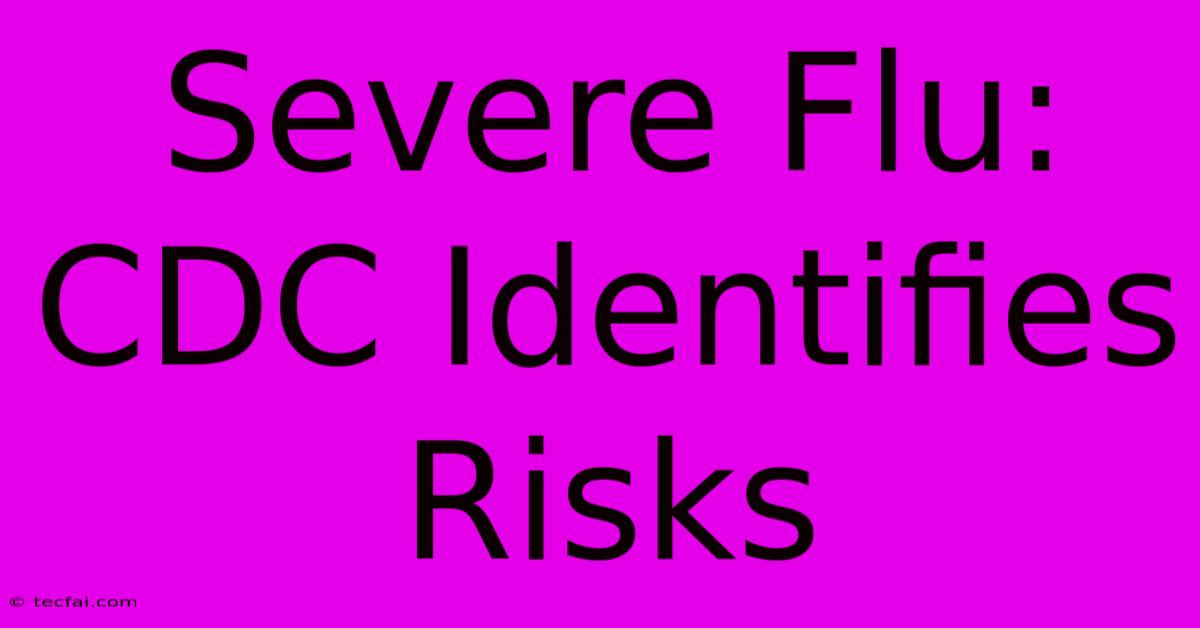Severe Flu: CDC Identifies Risks

Discover more detailed and exciting information on our website. Click the link below to start your adventure: Visit Best Website tecfai.com. Don't miss out!
Table of Contents
Severe Flu: CDC Identifies Risks
Influenza, commonly known as the flu, is a viral respiratory illness that can range from mild to severe. While most people recover without complications, the Centers for Disease Control and Prevention (CDC) highlights specific groups at higher risk of developing severe flu. Understanding these risk factors is crucial for proactive prevention and early intervention. This article will delve into the CDC's findings on severe flu risks and offer guidance on protecting yourself and your loved ones.
Who is at Higher Risk of Severe Flu?
The CDC emphasizes that certain individuals are significantly more vulnerable to severe flu complications, which can include pneumonia, bronchitis, ear infections, and even death. These high-risk groups include:
Adults 65 years and older:
As we age, our immune systems naturally weaken, making us more susceptible to severe illnesses like the flu. Older adults are at a considerably higher risk of hospitalization and death from influenza. Vaccination is particularly crucial for this population.
Young Children (under 5 years old):
Infants and young children have immature immune systems, making them less equipped to fight off the flu virus. Severe flu in young children can lead to various complications, including pneumonia and dehydration. Parental vigilance and prompt medical attention are paramount.
Pregnant women:
Pregnancy alters the immune system, making pregnant women more vulnerable to severe flu complications. Furthermore, severe influenza can increase the risk of premature birth, low birth weight, and other pregnancy-related complications. Vaccination during pregnancy is strongly recommended to protect both mother and child.
Residents of nursing homes and long-term care facilities:
Individuals residing in these facilities are often frail and have underlying health conditions, increasing their susceptibility to severe flu. The close proximity of residents also facilitates the rapid spread of the virus. Strict infection control measures and vaccination programs are essential in these settings.
People with chronic health conditions:
Individuals with chronic medical conditions such as asthma, diabetes, heart disease, kidney disease, and weakened immune systems are at much greater risk of serious flu-related complications. Managing underlying conditions effectively and receiving the flu vaccine are critical for this group.
Understanding Severe Flu Symptoms
Recognizing the signs of severe flu is critical for seeking timely medical care. While typical flu symptoms include fever, cough, sore throat, and body aches, severe flu can manifest with:
- Difficulty breathing or shortness of breath
- Chest pain or pressure
- Sudden dizziness
- Confusion
- Severe or persistent vomiting
- Flu-like symptoms that improve but then return with a high fever and worse cough
If you experience any of these symptoms, particularly if you belong to a high-risk group, seek immediate medical attention.
Preventing Severe Flu: The Importance of Vaccination and Prevention
The most effective way to protect yourself and others from severe influenza is through annual flu vaccination. The CDC strongly recommends vaccination for everyone six months of age and older. Beyond vaccination, other preventive measures include:
- Practicing good hygiene: Frequent handwashing, covering coughs and sneezes, and avoiding touching your face can significantly reduce the risk of infection.
- Staying home when sick: This prevents the spread of the virus to others.
- Getting enough rest and staying hydrated: A strong immune system is better equipped to fight off infection.
Conclusion: Proactive Steps for a Healthy Flu Season
Severe flu poses a significant threat, particularly to vulnerable populations. By understanding the CDC's identified risks, recognizing severe symptoms, and taking proactive steps like vaccination and practicing good hygiene, we can significantly reduce our risk of severe illness and help protect our communities. Remember, early intervention and proper medical care are vital in managing severe flu complications. Consult your healthcare provider for personalized advice regarding flu prevention and treatment.

Thank you for visiting our website wich cover about Severe Flu: CDC Identifies Risks. We hope the information provided has been useful to you. Feel free to contact us if you have any questions or need further assistance. See you next time and dont miss to bookmark.
Featured Posts
-
Washington Huskies Beat Oregon State
Nov 26, 2024
-
Al Gharafa Al Nassr Match Highlights 1 3
Nov 26, 2024
-
More On Ladbroke Grove Shooting
Nov 26, 2024
-
Maui Womans Father Found Deceased
Nov 26, 2024
-
2024 Nba Celtics Vs Timberwolves Odds
Nov 26, 2024
